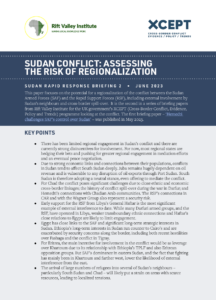This paper focuses on the potential for a regionalization of the conflict between the Sudan Armed Forces (SAF) and the Rapid Support Forces (RSF), including external involvement by Sudan’s neighbours and cross-border spill-over. It is the second in a series of briefing papers from Rift Valley Institute for the UK government’s XCEPT (Cross-Border Conflict, Evidence, Policy and Trends) programme looking at the conflict. The first briefing paper – ‘Hemedti challenges SAF’s control over Sudan’ – was published in May 2023.
KEY POINTS
- There has been limited regional engagement in Sudan’s conflict and there are currently strong disincentives for involvement. For now, most regional states are hedging their bets and pushing for greater regional engagement in mediation efforts and an eventual peace negotiation.
- Due to strong economic links and connections between their populations, conflicts in Sudan tend to affect South Sudan deeply. Juba remains hugely dependent on oil revenue and is vulnerable to any disruption of oil exports through Port Sudan. South Sudan is therefore adopting a neutral stance, even offering to mediate the conflict.
- For Chad the conflict poses significant challenges due to close ethnic and economic cross-border linkages; the history of conflict spill-over during the war in Darfur; and Hemedti’s connections with Chadian Arab communities. The RSF’s connections in CAR and with the Wagner Group also represent a security risk.
- Early support for the RSF from Libya’s General Haftar is the most significant example of external interference to date. While many Darfuri armed groups, and the RSF, have operated in Libya, weaker transboundary ethnic connections and Haftar’s close relations to Egypt are likely to limit engagement.
- Egypt has close links to the SAF and significant long-term strategic interests in Sudan. Ethiopia’s long-term interests in Sudan run counter to Cairo’s and are exacerbated by security concerns along the border, including both recent hostilities over Fashaga and the conflict in Tigray.
- For Eritrea, the main incentive for involvement in the conflict would be as leverage over Khartoum due to its relationship with Ethiopia’s TPLF and also Eritrean opposition groups. But SAF’s dominance in eastern Sudan, and the fact that fighting has mainly been in Khartoum and further west, lower the likelihood of external interference from the east.
- The arrival of large numbers of refugees into several of Sudan’s neighbours – particularly South Sudan and Chad – will likely put a strain on areas with scarce resources, leading to localized tensions.




